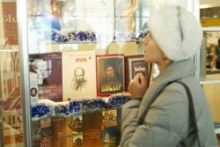“I will first stand by the edge of an abyss
And will suddenly understand,
deep in my sadness,
That there’s nothing in the world
Like a song in the Ukrainian language.”
The entire world marked International Mother Language Day on February 21. Established in 1999 by decision of the UNESCO General Conference, it is aimed at promoting linguistic and cultural diversity.
On this occasion, the National Parliamentary Library of Ukraine opened an exhibit of dictionaries (in orthography, phraseology, synonyms, translation, etc.) that testify to the specific development of our language. Incidentally, this year we are marking the publication centenary of the last volume of the Dictionary of the Ukrainian Language edited by Borys Hrinchenko. This was the first fundamental bilingual and partly explanatory dictionary with 68,000 entries.
Every developed country pays sufficient attention to publishing dictionaries. Moreover, high-profile publications become a national asset. Ukraine is, however, in what looks like an endless course of original capital accumulation, so liberal arts are still to gain momentum. One of the results of this is that dictionaries come out in a negligible print run—one or two thousand copies—in this country. However, the circulation of some of them has gone up to 5,000. One can buy them mostly in the capital and regional centers. As for small towns and villages, there are almost no bookstores left there. You can also find some in the libraries of megapolises — they are supposed to be there in compliance with the Cabinet of Ministers’ resolution obliging publishing houses to send a compulsory copy these libraries. But even this does not always occur. Meanwhile, a dictionary is about practical usage of the language. As a classic said, “Do not be afraid to use a dictionary: it is a lush ravine, not a dismal abyss.”
It is also about raising the prestige of the Ukrainian language. By far the best advice is to begin using it, both in everyday life and on all public occasions, all over the country—from the Crimea to Galicia. Then one will also be thinking in Ukrainian.
The Day asked its regional experts the question, “What measures will promote the prestige of the Ukrainian language best of all?” Iryna Farion, an associate professor at the Ukrainian Language Department of Lviv National Polytechnic University, gave an exhaustive answer: “Language is as way of life, not just a means of communication.”
Liudmyla NESTERENKO, Candidate of Sciences (History), Associate Professor, Head of the Department of World History and International Relations, Zaporizhia National University:
“The prestige of an official language begins when representatives of the state in question speak this language. Officials in our region and city could be more often heard speaking Ukrainian in the last while. I wish this trend would continue. Then Ukrainian will not be the language of a faraway Kyiv but the one of regional office-holders. This will be better than any kind of promotional campaign.
“I have noticed lately that the local mass media are switching over to Ukrainian without any major problems (at least in my view). It pleases me that this is occurring not only in the state-run TV and radio company but also in popular non-governmental local channels. Promotion clips are also increasingly using the Ukrainian language.
“The students we deal with also feel a growing need to know Ukrainian. As the Ukrainian language is being introduced in paperwork and various fields of activity and the economy, this requires that the would-be specialist master professional vocabulary. Just a few years ago you could hear students asking you to teach the course in Russian. Now those in classrooms are prepared to accept the Ukrainian language and wish to obtain professional information in Ukrainian.
“The Ukrainian language should not be introduced by way of high-sounding and showy campaigns or by provoking conflicts. Steady and purposeful efforts will have a better effect.”
Serhii DOVHAL, chairman, Dnipropetrovsk oblast branch of the Prosvita all-Ukrainian society:
“What prestige of the official language can you talk about when all region- and city-level top bureaucrats mostly use Russian even on official occasions, not to mention out-of-office situations? The only real change in the official sphere is switching to Ukrainian in paperwork. But there are exceptions even here: for example, in courts judges very often switch to Russian, bowing to the wishes of the parties to the trial. Besides, even when Ukrainian is used, it is not the standard language. Three years ago, the then governor Nadia Dieieva launched a Ukrainian language course for Dnipropetrovsk oblast administration officials. But this did not last long: only one batch of learners completed the studies and that was the end of this. Yet, proficiency in the official language is a professional requirement for public servants. It is like legs for a ballerina—if you can’t dance, you must go away.”
Vasyl BONDAR, chairman, Kirovohrad oblast branch of the League of Ukrainian Writers:
“Unfortunately, in Kirovohrad and district centers, especially at governmental and some educational institutions, Ukrainian does not sound as clear and strong as an official language should. But, in spite of this, it is drawing increasingly greater support from the populace, especially young people. This is being achieved by way of large-scale and, what is more, non-politicized projects now regularly held under the auspices of the oblast council.
“In particular, it is worthwhile to mention the annual competition of the oblast’s amateur theatrical clubs, Theatrical Spring of the Kirovohrad Region, which marks its 50th anniversary this year. It is here, from the stage, that you can hear colorful Ukrainian as spoken by amateur actors who show distinct particularities of every district.
“It is a great honor for our region, the cradle of Ukrainian professional theater, to hold another illustrious theatrical show that gathers the admirers of Melpomene from all over Ukraine and even from abroad in the hamlet of Nadia, the family nest of the Tobilevych brothers. September Gems, an all-Ukrainian festival of theatrical art, is a showcase of our oblast, perhaps unrivaled throughout Ukraine.
“Two more projects, which have long surpassed the regional level and reached the national one, are the choral singing festivals ‘I Pray for You, Ukraine!’ and ‘Snowball Tree Songs,’ which popularize the beauty of the Ukrainian song and the Ukrainian word. The number of those who wish to take part in these events is always on the rise, which reflects the high level of the participants’ organization and performing skills.
“And, naturally, we should not forget another event that became an integral part of the Kirovohrad region’s cultural life a few years ago—the Yenhen Malaniuk Literary Prize established by the oblast council to honor talented authors in our region. At the same time, there are problems with introducing the official language in Kirovohrad National Technological University, the Aviation Academy, and other institutions, where the faculty uses the language of a neighboring state to communicate with their students.
“Kirovohrad oblast is located in the center of Ukraine and realistically reflects the status of the Ukrainian language throughout the country. Naturally, we, as well as other regions, do have problems with the introduction of Ukrainian. Still, no matter what difficulties patriotic ideas may encounter, we have the main thing: our state and our language.”
Iryna FARION, Associate Professor, Department of the Ukrainian Language, Lviv National Polytechnic University:
“What is the problem of today’s linguistic situation? If society addresses it at the level of the 19th century, i.e., by folklore-style methods, such as feasts with embroidered shirts and mushy lyrical verses about the nightingale-type melodiousness of the Ukrainian language, the situation will not change. Our language problems are totally political. But if we put them in a legal plane, they will be solved very easily and simply. The Criminal Code should be complemented with the clause ‘On Criminal Liability for Violating Article 10 of the Constitution of Ukraine.’
“Here is what we are doing in our region. Lviv oblast is a pioneer in extremely interesting things: at the beginning of every Lviv Oblast Council session, every deputy receives a printout of their linguistic mistakes, and I analyze these mistakes for 10 minutes without calling names because it is not about personalities—it is about the language, i.e., the air we breath.
“To reach beyond the city hall and university rooms, we have put up culture-of-language stickups in public transport under the general headline ‘Let Us Speak Correctly and Nicely.’ These stickups travel on taxi minibuses not only in Lviv proper but also across the region. A new set of stickups is ready, and they will bedeck 4,800 public transport vehicles next week.
“We are also launching a new campaign under the same name, this time designed for kindergartens. I receive a huge number of letters and phone calls from people who are bitterly resentful about the language children speak at daycare facilities. I do not care about the language of the people who have stuck in the Soviet era and of those who still cannot understand that in Ukraine one should speak Ukrainian. I am more concerned about the language of our younger generation. I therefore categorically oppose it when kindergartens try to instill purely Russian words in the subconsciousness of children—I believe this is a threat to national security.
“We are going to present about a hundred Lviv kindergartens with language-related posters. One of the posters bears the slogan ‘Safeguard Your Language” and shows a father who is leading his child by the hand and holding an umbrella over him. The umbrella has been hit by two thunderbolts: Russification and pidginization. The other poster depicts an old witch who has kidnapped a child that represents language: ‘An awful pidgin-speaking witch stole my mother language, and you must return it on your tender lips.’ The authors of these posters are my students, the would-be designers and architects.
“There is one more interesting innovation. We place posters, also devoted to the language problem, on Lviv’s advertising boards and in light-boxes: one of them shows a gorgeous portrait of Lesia Ukrainka and the slogan ‘Word, You Are My Only Weapon.’ In this way we are trying to draw people’s attention to the language problem—not as something to cry over but as a weapon with which to protect and change the world.
“Here is one more of our latest presents to the language: last week I urged a Lviv Oblast Council session to launch Ukrainian language courses for nationals and non-nationals. These courses will open in September at the Institute of Teachers’ In-Service Training. They are intended to ensure two levels of language command. The first level is Ukrainian as a foreign language for, above all, foreigners. The second level calls for an improved culture of speech: it is about the language as esthetics and an item of oratory mastery. And, finally, I have written, on the basis of what I can hear in our all-permissive informational space, a monograph on the way politicians speak, titled Linguistic Standards: Elimination, Search, and Revival. I hope it will also help promote understanding that the language is a way of life, not just a means of communication.”
Leonid KISELIOV (1946—1968) is a well-known Ukrainian poet. He was born in Kyiv into the family of Volodymyr Kiseliov, a Russian-speaking poet. He began to write in Russian but in April 1968 he suddenly published (The First Chords), a collection of Ukrainian-language poems. Affected by leukemia, he departed this life at the age of 22.








